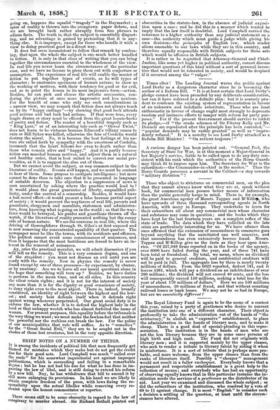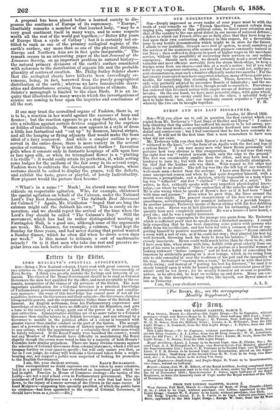BRIEF NOTES ON A. NUMBER OF THINGS.
IT is among the incidents of political life that men frequently get blamed for mistakes which they make but do not get the credit due for their good acts. Lord Campbell was much" called over the coals" for his somewhat inquisitorial act against improper Publications, which is succeeding and failing in a remarkable degree ; but he has not had his due for what he has done in im- roving the law of libel, and is still doing to extend his reform bY a new bill. Nay, he has withdrawn that bill to amend it by still more enlarging its provisions. In his hand we are likely to obtain complete freedom of the press, with laws fixing the re- sponsibilty upon the actual libeller while removing every re- straint upon the honest commentator or reporter.
There seems still to be some obscurity in regard to the law of Conspiracy to murder abroad. Sir Richard Bethell pointed out
obscurities in the statute-law, in the absence of judicial exiiosi- Con upon a ease; and he did this in a manner which tended to imply that the law itself is doubtful. Lord Campbell carried the reference to a higher authority than any judicial statement on a case—the authority which must guide a judge while giving his own decision—the principles of English law, which render aliens amenable to our laws while they are in this country, and therefore equally responsible with British subjects for those acts which would be offences in British subjects. - It is rather to be regretted that Attorney-General and Chief- Justice; like some yet higher in political authority, cannot discuss important questions of this End without a sort of personal invec- tive that would not be tolerated in society, and would be despised if it occurred among the "vulgar."
Times alter ! The Leading Journal warns the public against Lord Derby as a dangerous character since he is becoming the author of a Reform Bill. "It is at least certain that Lord Derby's pledge cannot have been preceded by any deliberate consideration, nor can it have referred to a definite plan : but it is scarcely pru- dent to condemn the existing system of representation in favour of an unknown and indefinite substitute. Those who are least enthusiastic in favour of change ought most strongly to deprecate random and insincere efforts to tamper with reform for party pur- poses." For if the present Government should survive to forfeit its pledge,—if "the crude schemes of Sir Fitzroy Kelly and Mr. Disraeli are repudiated after the principle has been conceded,"— " popular demands may be rashly granted" as well as "impru- dently refused." It is a novelty to see Lord Derby attacked as a Refoim. Bill Minister ! "On revient tonjours ! "
A curious danger has been pointed out. "General Peel, the Secretary of State for War, is at this moment a Major-General in her Majesty's service, liable to be called upon to do any duty con- sistent with his rank which the authorities of the Horse Guards may think fit to impose upon him. The Secretary for War is the subordinate--the Commander-in-chief is the master." Thus the Horse Guards possesses a servant in the Cabinet—a step towards "military dictation " !
Those who object to strictures on commercial men, on the plea that they cannot always know what they are at, speak without book, for commercial men possess better means of information than the public generally keeps in mind. There is for example, the great American agency of Messrs. Tappan and il‘Killota, who have upwards of three thousand corresponding agents in North America, with many in Europe. They undertake to learn for their subscribers all about any commercial men whose character and substance may come in question ; and the books which they have kept for the last fourteen years are a complete reflex of-the state of trade. The data which they have collated on the late crisis are particularly interesting for us: We have oftener than once affirmed 'that the extension of unsoundness in commerce goes beyond anything that the uninitiated can well conceive, and that unsoundness has even extensively become fraud. Messrs. Tappan and II‘Killop give us the facts as they bear upon Ame- rica. "Of 227,048 firms reported on in the books of the agency, over 6000 have failed during the year, and of these 741 have been total or fraudulent. By total, we mean, where no dividend will be paid to general creditors, and confidential creditors will not be paid in full. The aggregate loss by these is nearly twenty millions of dollars. From the 6022 reported, deduct 741, and it leaves 5281, which will pay a dividend on an indebtedness of over 280 millions ; the dividend will not exceed 40 cents and the loss will consequently exceed 150 millions, making a teal loss for the year of about 170 millions of dollars." Here we see 150 millions of unsoundness, 20 millions of fraud, and that without counting railroad losses or bank losses. We may not be so bad in Europe, but are we essentially diprent ?
The Royal Literary Fund is again to be the Beene of a contest this year, raised by a party. of gentlemen who desire to convert the institution into one of a different character. Their object is professedly to take the administration out of the hands of "the aristocracy," to abolish an "expensive" establishment, to place the administration in the hands of literary men, and to make it cheap. There is a good deal of special-pleading in this repre- sentation. The institution is in the hands of men who are not the less literary because they are in some eases persons of high birth and high rank. The Fund did not originate with literary men ; and it is supported mainly by the upper classes, who seek to render a tribute to literary talent by aiding it when in misfortune. It is a sort of tribute that is perhaps more pro- bable, and more welcome, from the upper classes than from the ranks of literature itself. Possibly a "cheaper" management would not result in a fuller exchequer. Everybody knows that a permanent and respectable establishment is a great help to the collection of means ; and everybody who has had an opportunity of observing equally knows that in this particular instance the in- stitution needs the services of a gentleman as the distributor of its aid. Last year we examined and discussed the whole subject ; so did the subscribers of the institution, who resolved by a vote of 69 to 11 against change. It is most "English" to consider such a decision a settling of the question, at least until the circum- stances have altered. A proposal has been placed before a learned society to dis- possess the continent of Europe of its supremacy. "Europe," charitably remarks a member of that learned body, "may Be a very good continent itself in many ways, and in some respects worth all the rest of the world put together,—' Better fifty years of Europe than a cycle of Cathay ' ; but it is certainly not en- titled to rank as one of the primary zoological regions of the earth's surface, any more than as one of the physical divisions. Europe and Northern Asia are in fact quite inseparable." The remark occurs in an interesting paper of the last Journal of the Litnucan Society, on an important problem in natural history— the natural primary divisions of the earth's surface considered with reference to the distribution of organic life and the probable plurality of centres of creation. Mr. Philip Salley Sclater shows that the zoological charts have hitherto been exceedingly er- roneous, being, in fact, borrowed from the purely geographical distribution of the earth ; whereas we have innumerable diver- sities and disturbances arising from distinctions of climate. Mr. Sclater's monograph is limited to the class Birds. It is an in- quiry that illustrates the many ways in which the investigations of science an coming to bear upon the inquiries and conclusions of all the rest.
If one may trust the accredited organs of Fashion, there is, or is to be, a reaction in her world against the excesses of hoop and flounce ; but the reaction appears to go a step further, and to in- cite a rebellion against certain devices suggested by the caprices or foibles of individuals. Woman now appears in a style of dress a little less fantastical and "cut up" by flounces, lateral stripes, and all the hanging or flying adjuncts that would make the beau ideal of a fairy scarecrow. And while a simpler outline is pre- served in the entire dress, there is more variety in the several species of costume. Why is not this carried further ? Invention palls when it consists only in fantastic heapings of silk upon lace or lace upon silk, or when its triumphant flower is a "plaiting a la vieille " : it would really attain its perfection, if, while setting some badges for the uniform of the fair army in its several corps, Fashion were to cultivate the development of Irregulars' whose costume should be suited to display the graces, veil the defects, and exhibit the taste, grave or playful, of lovely Individuality. How piquant would the picture then become !
"What's in a name ?" Much ! An absurd name may throw ridicule on respectable agitation. Who, for example christened the special agitation on behalf of the Cabmen, under le National Lord 'F; Day Rest Association, as "The Sabbath Rest Movement for Cabmen" ? Again, Mr. Girdleston "hoped that ere long the cabman might call the Sabbath his own." This is surely an in- novation, and we should regret the arrival of the time when the Lord's Day should be called "The Cabman's Day." Still the movement, which has had its rather distinguished meeting at Farringdon Hall, is a good one, although some of the arguments are weak. Mr. Chiumer, for example, a cabman, "had kept the Bunday for three years and had never during that period wanted a Sunday dinner, which he often did when he drove seven days per week." Is this meant to intimate a sort of unobtrusive miracle ? Or is it that men who take due rest and preserve re- gular lives can look better after their own interests ?



































 Previous page
Previous page